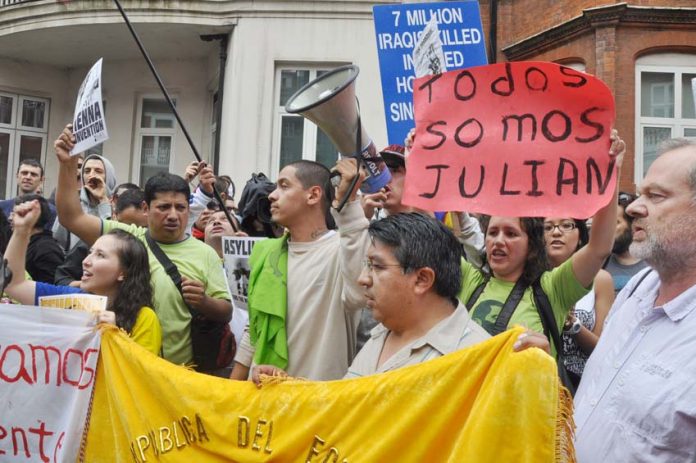
THE draft communications data bill is a serious attack on the privacy of citizen’s electronic data and will severely restrict the freedom of the press – says the NUJ.
The NUJ added its opposition to the draft communications data bill – otherwise known as the snoopers’ charter – as a joint committee of MPs and peers published a highly critical report.
The union supports the call on the government by the pre-legislative parliamentary Joint Committee to significantly amend the bill so that the Home Secretary is not given ‘carte blanche to order retention of any type of data’.
The draft bill would allow the government to order a communications service provider – such as Facebook or BT – to collect and store the communications data relating to all of the traffic they deal with.
This would include details of internet usage, including websites visited, internet searches, private social media messages and even the online video games played.
Law enforcement agencies will be able to trawl that data and cross reference it with other data sources through a communications data search engine, revealing social connections and confidential communication between journalists and their sources.
The NUJ’s code of conduct says a member must protect the identity of sources who supply information and materials in confidence. The union condemned News Corporation when it handed over emails to the police which led to reporters’ sources being revealed.
The Parliamentary committee told the Home Office that the draft bill must be significantly amended. It said: ‘The Joint Committee believes that if Clause 1 of the draft Bill – which, as currently drafted, gives the Home Secretary sweeping powers to order the retention of any kind of communications data by any communications service provider – is narrowed, and safeguards are put in place to ensure that any new powers are not abused, a new Bill could be introduced that would work. It would both allow the security services, law enforcement agencies and a few other public authorities access to the communications data they need to protect and serve UK citizens without trampling on the privacy of those citizens.’
It described the Home Office’s estimated price tag of £1.8bn over 10 years as ‘fanciful and misleading’.
Michelle Stanistreet, NUJ general secretary, said: ‘This draft bill is a major assault on civil liberties for all citizens and a threat to press freedom. For journalists it would be a direct attack on the way they work and would severely undermine their ability to protect their sources, materials and whistle-blowers.’
The Joint Committee’s other recommendations include that:
• proper consultation should take place before any revised proposals are bought forward;
• fewer public authorities should be able to access communications data;
• the Bill should include new definitions of communications data, that are narrower in scope, draw a clearer line between data and content and will stand the test of time;
• the current internal authorisation process for accessing communications data should be strengthened and enshrined in primary legislation, a specialist, centralised service should be established;
• the Interception of Communications Commissioner should scrutinise more closely the use of communications data, his annual reports should be more thorough and he should have more resources at his disposal. He should have a special role in supervising the operation of the new Request Filter which is essentially a federated database of all UK citizens’ communications data;
• wilful or reckless misuse of communications data becomes a specific offence that is punishable, where appropriate, by a prison term; and
• the costs of implementing the draft Bill are likely to be significant, the current estimates are not robust and a new cost benefit analysis must be published at the same time as any redrafted Bill, based on the Committee’s recommendations for wider consultation and narrower powers of the Bill.
Nick Clegg, the deputy prime minister, said: ‘I believe the coalition government needs to have a fundamental rethink about this legislation. We cannot proceed with this bill and we have to go back to the drawing board. We need to reflect properly on the criticisms that the committee have made, while also consulting much more widely with business and other interested groups.’
Earlier, the NUJ had expressed grave disappointment at the decision of a court in Northern Ireland to compel photographers to hand over footage of the riots in Belfast on 12 July 2012.
Judge David McFarland ruled that press photographer’s unbroadcast footage held by the Press Association and two photo agencies, Press Eye and Photopress, must be handed over to the police.
The judge also ruled that the BBC, UTV and Sky did not have to hand over footage.
The BBC has reported that Judge David McFarland said he had to balance the public interest of identifying and prosecuting rioters against the potential risk to journalists if seen to be assisting in the police investigation.
He stated: ‘There is no evidence to support the proposition that journalists may become the targets of attack should they be perceived to be evidence gathering for the police.’
NUJ Irish Secretary Seamus Dooley said the decision of the Belfast Recorder was ‘a serious blow to media freedom at a time when photographers were under threat from a number of sources in Northern Ireland.’
He added: ‘It is disappointing that the Recorder refused to accept the principle that media workers should never be put in the position of quasi police officers.
‘He refused to acknowledge the risk which arises when independent journalists are perceived to be potential agents of the State. It is surprising that he found there was no risk in journalists handing over material.
‘In a week in which a working photographer was struck by a police baton in a dangerous riot situation in Belfast this ruling is another setback for the freedom of the press in Northern Ireland and we will be considering carefully the implications of the ruling.’